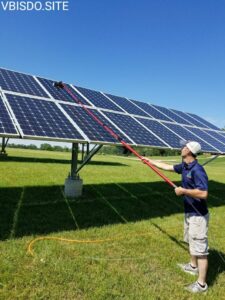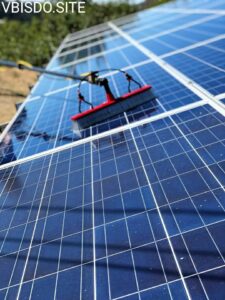“How do you clean solar panels on roof?” people often question as solar energy becomes a mainstay in household and business power sources. Maintaining the effectiveness of your rooftop solar panels and guaranteeing your greatest return on investment depend on their being clean.
This article will lead you through the why, when, and how of cleaning your solar panels—including safety advice, equipment, and common errors to avoid.
Why Should You Clean Solar Panels?
Generation of power from solar panels depends on sunshine. Dirt, dust, bird droppings, pollen, and other trash may accumulate on the surface over time, obstructing sunlight and therefore lowering the panel’s effectiveness. Depending on how filthy the panels are, this might cause up to 20% or more of a loss in energy generation.
Main Advantages of Maintaining Your Solar Panels:
-
More energy produced
-
Greater panel lifetime
-
Improved return on investment
-
Better look
When Should One Clean Their Solar Panels?
Frequency of cleaning depends on your surroundings and location. Generally speaking:
-
For most households, a decent rule of thumb is every six months.
-
Quarterly: If you live in a dusty, arid environment or close to zones of pollution.
-
Clean your panels whenever there is residue, ash, or trash after a storm or fire.
-
When efficiency declines: Dirt might be the offender if you see a decline in solar output unrelated to weather.
Is Roof Cleaning of Solar Panels Safe?
First and most importantly is safety. Cleaning solar panels on a single-story house with easy access might be a reasonable do-it-yourself job. Hiring an expert is advised and safer, nevertheless, for steep, high, or slippery rooftops.
Steer clear of operating in damp or windy weather and never tread right on the solar panels.
What Tools You Will Need to Clean Solar Panels on Roofs?
You do not need costly solutions or complex instruments. Most manufacturers advise mild, non-abrasive cleaning techniques.
Simple Cleaning Tools Include:
-
A squeegee or soft brush with an extensible handle
-
Garden hose with a spray nozzle; steer clear of high-pressure washers
-
Bucket with mild dish soap and warm water
-
Microfiber cloth or soft sponge
-
Safety gear: gloves, non-slip shoes, harnesses
Pro Tip:
To prevent quick evaporation and streaks, wipe your panels early in the morning or late in the evening if at feasible.
Methodical Guide: How Should One Clean Solar Panels on Roof?
1. Turn off the system
Shut off your solar panel system first. See your installer or refer to the manufacturer’s handbook.
2. Review Manufacturer Directions
There are certain panels with particular maintenance advice. Before using cleaning products, always review the instructions.
3. Go with Water First
Remove loose dust, grime, and leaves by hosing the panels. For simple upkeep, this is frequently sufficient.
4. Give a Thorough Scrub
If filth doesn’t go away, combine mild soap with warm water. To softly clean every panel, dip your soft brush or sponge.
Steer clear of excessively aggressive cleaning to avoid glass scratches. Never use strong chemicals, detergents, or abrasive pads.
5. Wash Fully
To eliminate any soap residue—which, if left behind might form streaks or draw additional dirt—rinse with fresh water.
6. Dry (Optional)
For a streak-free finish, let the panels air dry or run over a rubber squeegee.
7. Reset the System
Turn your solar system back on once dry and clear.
How Not to Clean Solar Panels
Many homeowners use the incorrect technique and unwittingly harm their panels. Steer clear of these often made mistakes:
-
High-pressure streams in pressure washers may compromise panel seals and electrical components.
-
Rough cloths, steel wool, or wire brushes may all harm the surface.
-
Strong cleansers like bleach, ammonia, and industrial solvents can invalidate your warranty or cause irreparable harm.
-
Cleaning when hot: Mineral deposits and streaks result from overly fast water evaporation.
Can Rainwater Wash My Solar Panels?
Although rain helps clear surface filth, it is frequently insufficient for complete cleaning—especially in cases involving sticky residue like bird droppings or tree sap.
See rain as a rinse rather than a scrape.
Which is Better—Do It Yourself or Professional Cleaning?
Pros of DIY Cleaning:
-
Affordable
-
Simple for houses with one storey
-
Useful for routine maintenance
DIY Cleaning Cons:
-
Dangerous on multi-story or steeply inclined roofs
-
Not likely to eliminate difficult accumulation
-
Time-consuming
Professional Cleaners:
-
Certified in rooftop safety
-
Use filtered water and certain tools
-
Often involve system inspection
Professional Cleaning Cons:
-
Depending on the work, costs between $150 and $400
-
Could need scheduling
If your system is big, complicated, on a high roof, or you lack confidence, you would be better off going professional at least once a year.
How Do You Find Out Whether Your Solar Panels Need Cleaning?
These are some indicators:
-
Unexpected drop in production of energy
-
Visual dirt buildup
-
Bird nests or excessive dropping behaviour
-
You reside in a region rich in dust or pollen
Manufacturers like Enphase, SolarEdge, or Tesla have supplied solar monitoring applications you may also use to keep an eye on your system.
Bonus Advice on Long-Term Solar Panel Maintenance
-
Cut surrounding trees to reduce trash and shadow
-
Put up critter guards to prevent squirrels or birds from nesting
-
If at all possible for your panel type, use anti-soiling coatings
-
Plan performance and safety yearly inspections
Ultimately, Clean Panels Equate to Clean Energy
How then can one clean solar panels on a roof? Gently, securely, and consistently.
Your solar panels will keep running effectively for 25 years or more with only a little amount of effort or expert assistance. Whether you like do-it-yourself projects or want to outsource, consistent cleaning helps maximise your solar investment and maintain optimal condition of your system.
Questions: How Should One Clean Solar Panels on Roof?
Q: Can I personally clean solar panels?
Yes, if your roof is accessible and safe. Just use water, a soft brush or cloth, and some mild soap.
Q: Should one pay a professional?
For big, difficult-to-reach, or badly filthy panels—absolutely. Often more efficient and safer is it.
Q: If panels are dirty, how much energy is lost?
Based on local conditions and buildup, dirty panels can lose anywhere from 5% to 25% efficiency.
Q: Should I clean my rooftop solar panels often?
At least once every two years. More often in dusty or bird-heavy environments.

